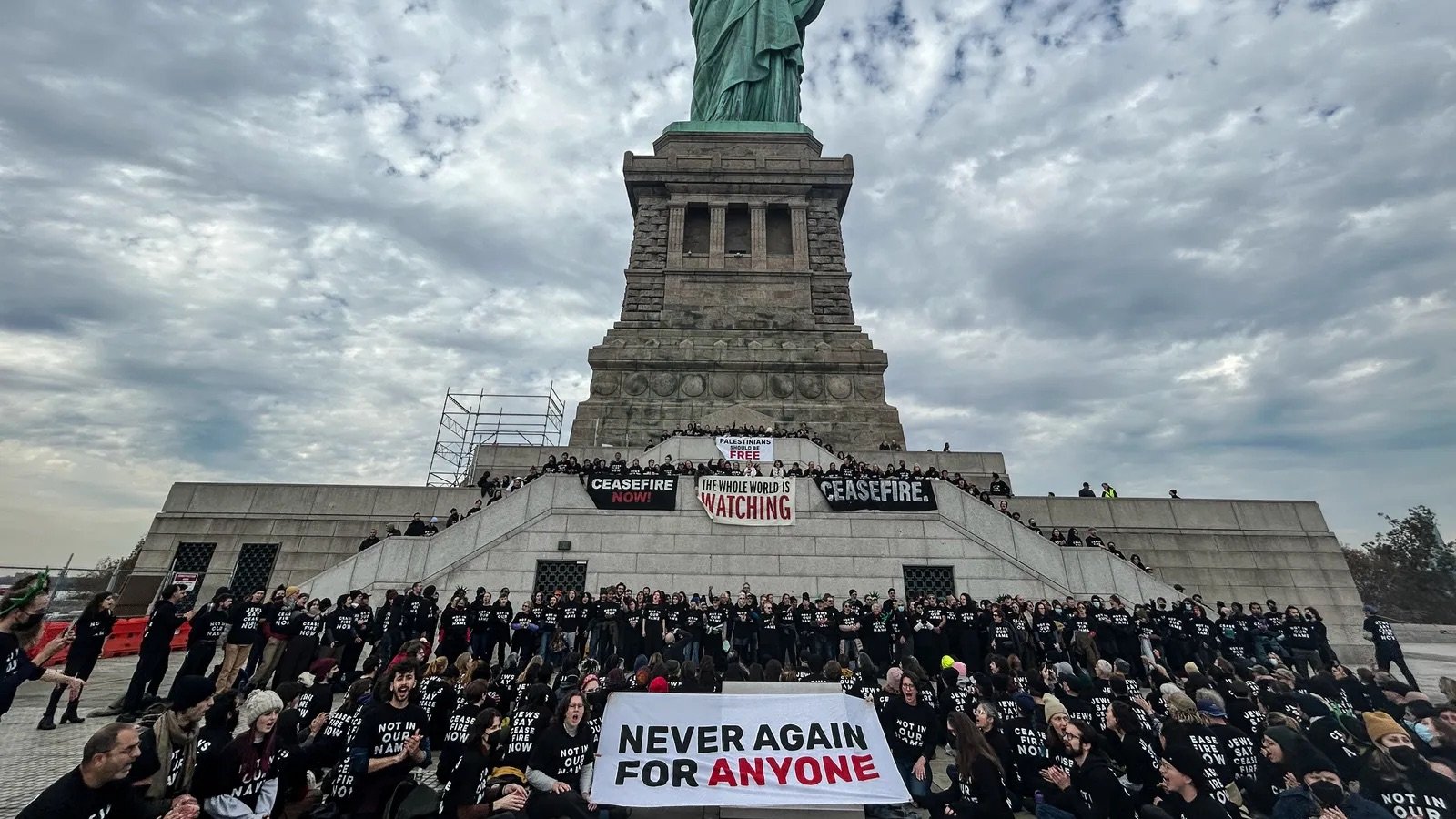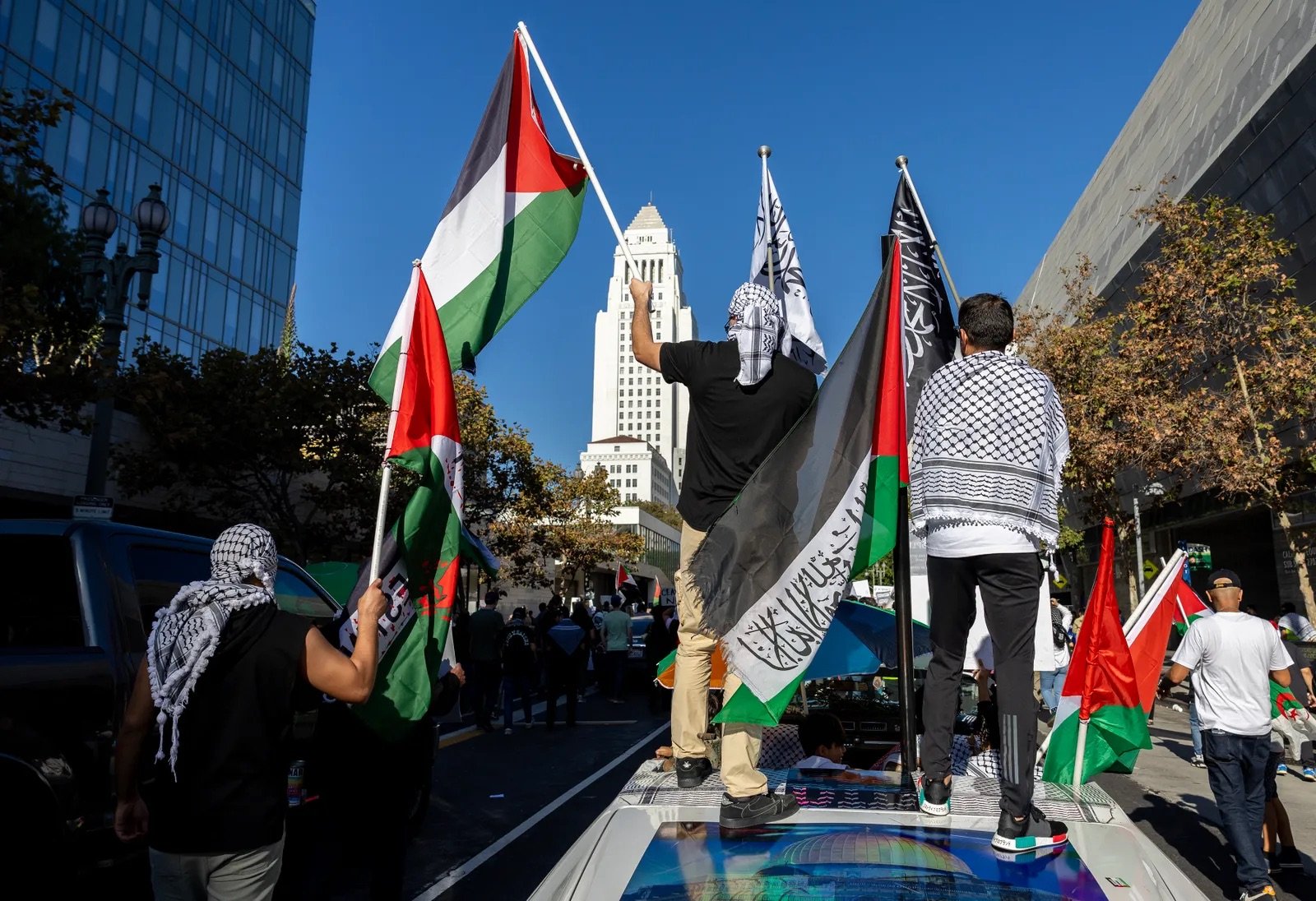How Anti-Zionist American Jews Are Organizing For a Ceasefire in Gaza



Stephanie Keith / Getty Images
Anti-war Jewish Americans, an outlier group within their Jewish communities, are urging U.S. leaders to call for a ceasefire.
Over the past two months, a progressive wing of American Judaism has gained prominence, one defined by mass mobilization against the Israeli government's unrelenting bombing in Gaza. That intergenerational community – nearly always youth-led, but with those old enough to be Holocaust survivors regularly involved – has faced police pepper spray at the DNC, sat on hunger-strike with Palestinian organizers outside the White House, interrupted politicians at dinner, and shut down transit centers across the country.
In November, more than 400 New Yorkers, most of them Jewish, covertly entered the Statue of Liberty to hold a sit-in on the pedestal of that monument calling for a ceasefire. Dressed as tourists, they boarded boats to the statue in small, disconnected groups among the thousands who visit the statue each day. Once they convened, they hung “CEASEFIRE NOW” banners from the statue’s pedestal and chanted for just under an hour before leaving the island on a tourist ferry.
The sit-in at the Statue of Liberty was one in a series of disruptive actions held by groups of American Jews for a ceasefire in Gaza. On Friday, October 27th, as dusk fell over Grand Central Station, commuters were unable to make their way through the midtown Manhattan hub — not because of usual rush hour traffic, but because of several hundred protesters led by the progressive anti-Zionist American Jewish group Jewish Voice for Peace, staging a sit-in in the main terminal. More chanted outside, blocked from the entryways by police. Activists clambered up the departures board to drop banners, and stood there until the police used a boom lift to arrest them and lower them down.
As the American government continues to send messages of support, and funding, to Israel’s siege on Gaza, young people across the country have mobilized to call for an end to the violence; in particular, Palestinian-American led groups such as the Palestinian Youth Movement have organized teach-ins, cultural events, and mass protests drawing thousands week after week across the country. Recent Gallup Poll numbers show that 67% of Americans under 35 oppose Israel’s actions in Gaza, while progressive think tank Data for Progress has released polling that states 61% of Americans overall support a permanent ceasefire.
Stephanie Keith / Getty Images
Meanwhile, within the Jewish American community, the political divide is to some degree generational: in a Jewish Electorate Institute poll in November, 83% of those over 36 supported Biden’s handling of the war, while only 53% of American Jews under 36 agreed. That makes anti-war Jewish Americans an outlier group in the Jewish community, while their religion also makes them a minority part of the broader American left. They have taken on two roles: as headline-grabbing stagers of civil-disobedience and co-crafters of what a pro-Palestinian Judaism can look like.
They urged U.S. leaders to call for an end to the Israeli military’s ongoing assault on the people of the Gaza Strip, which has killed over 15,000 Palestinians since Oct. 7th, an estimated 5,000 of whom were children, according to the United Nations Office for the Coordination of Humanitarian Affairs and the Gaza Health Ministry. CNN calculations from November suggested a child is killed in Gaza every 10 minutes, based on Gaza Health Ministry figures.
On October 7th, Hamas militants from the Gaza Strip attacked Israel, killing at least 1,200 Israelis and foreign nationals and abducting about 240 into Gaza. Over 100 of those hostages have since been released in a prisoner exchange, along with hundreds of Palestinians held in Israeli jails. That doesn’t mean the taking of prisoners has ceased: Israeli NGO HaMoked estimates that 7,000 Palestinians are currently in Israeli prisons, nearly 2,900 of whom are held without charge. Since Israel declared war on Hamas, its nonstop bombing campaign of the Gaza Strip, a 140-square-mile piece of land, ceased for a week then began again in December.
Israeli airstrikes have destroyed nearly all of Gaza’s internet infrastructure, and the Israeli government announced it would cut off water, fuel, food, and electricity supplies, the New York Times reported. There are currently no fully open border crossings, leaving Palestinians in Gaza with practically nowhere to run from the bombs, though a few who are severely injured or hold foreign passports have been able to evacuate to Egypt.
In the U.S., meanwhile, both Islamophobic and antisemitic harassment have increased since October 7th, as has outright violence: A Palestinian child was killed in what was ruled a hate crime on October 14th in Chicago in a stabbing attack, and a Jewish man attending a pro-Israel rally died from blunt-force head trauma after an altercation with a counterprotestor (authorities are investigating whether his death was a hate crime, ABC News reports). Pro-Palestinian student groups at Columbia University and George Washington University have been suspended and prohibited from operating as clubs on their campuses. Over Thanksgiving, 3 Palestinian college students were shot in Vermont while speaking Arabic and wearing keffiyehs.
A congressional committee hearing on the issue of combatting antisemitism on campuses occurred December 5th, with the presidents of University of Pennsylvania, Harvard, and other institutions attending. It’s in this context that these young people choose to organize against the war — and they say their Judaism led them to that choice.
“Come to the capital on October 18”
About a week before protesters descended on Grand Central, five thousand progressive Jewish people and allies arrived in Washington, D.C. from all corners — buses out of New York, on flights in from Los Angeles and Toronto, Priuses jam-packed from Jersey. Four days earlier, a group of organizers with progressive Jewish groups Jewish Voice for Peace and IfNotNow put out a call on Instagram: Come to the capital on October 18 and show that they stand against what the U.N. has warned could be a mass ethnic cleansing of Palestinian people.
Sumaya Awad, a Palestinian organizer with Adalah Justice Project, spoke in D.C. on the 18th. “It was especially critical to see thousands of American Jews come up and say, Israel is not acting in our name,” Awad told Teen Vogue.
What ended up being the biggest Jewish-led mobilization for Palestine in American history came together in about 72 hours. A reported 5,000 to 10,000 people trickled into D.C. between Monday and Wednesday, crashing on the couches and floors of friends and acquaintances. Spreadsheets were hastily shared in Signal group chats and filled up with the names of people staying behind, signing up to take care of other people’s pets while they were away.
On Wednesday, October 18, about 300 people were arrested in the U.S. House of Representatives Cannon Office Building, which they occupied for several hours with one clear demand: that the U.S. government work towards a ceasefire in Gaza. That demand has not changed in the intervening weeks – though, as President Biden is in support of the current “humanitarian pause” plan, the call for “ceasefire now” has shifted to include the word “permanent.”
The U.S. helps fund the Israeli military with 3.8 billion dollars in military aid per year. Many young Americans – as they did during the Vietnam and Iraq wars – are demanding accountability from their government for their country’s role in the violence.
Jay Saper, 32, an organizer with Jewish Voice for Peace, barely slept in the 10 days between the Hamas attack and the D.C. action. In the weeks since October 7, Saper has put their entire life “on hold.” Seeing most Jewish cultural institutions standing behind Israeli military action, Saper wanted to highlight another Jewish viewpoint, one many young people share. So, Saper said, they needed to “pierce through that narrative.”
“We cannot stand idly by as President Biden pledges more monetary support to the State of Israel,” Saper said. With their co-organizers, they feel a specifically Jewish impulse to dissent. “We have to make so clear, as Jews, that we do not believe our safety can ever come at the expense of another community.”



